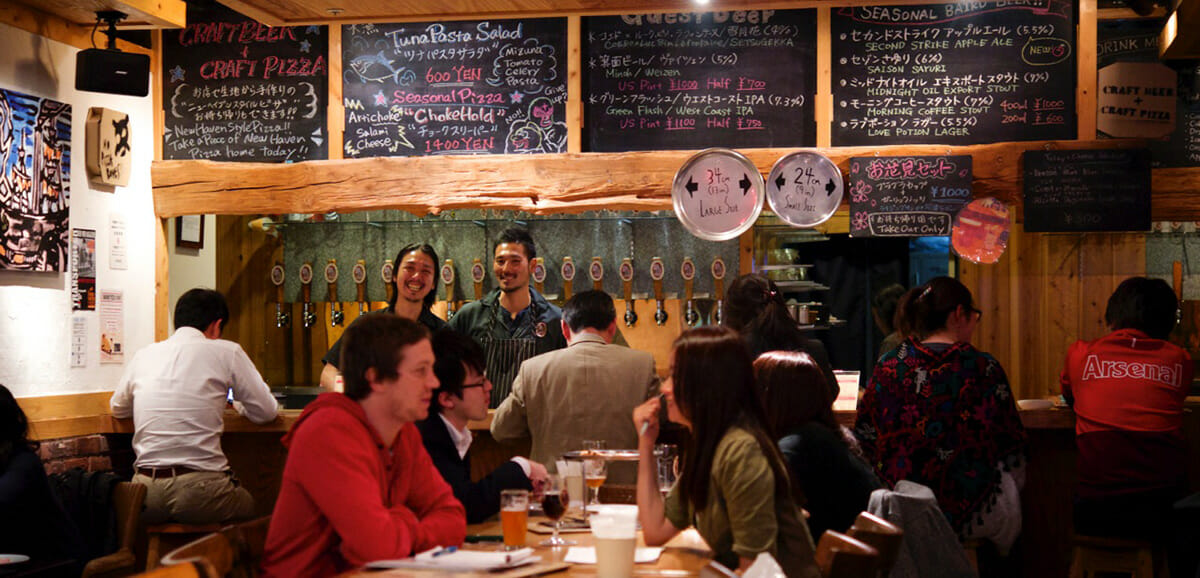Japanese craft brewers are honing their skills and developing new traditions.

The Dutch brought beer to Japan in the 1600’s, but it took a few centuries to catch on; Eventually, light, lager-like brews produced by Asahi, Kirin and Sapporo came to dominate and, for many, define beer. Craft beer, with its variety of flavors and styles, remained rare and expensive.
Then in 1994, a change in tax laws made it much cheaper to produce beer in limited quantities, and as a result, hundreds of small breweries opened. However, according to Mark Meli, author of Craft Beer in Japan: The Essential Guide (2013), most of these 400 new operations fizzled due to poor management and lackluster brews. Especially in rural areas, craft breweries were seen more as an economic Hail Mary than an opportunity for top-notch beers. Some backers hoped the novel beverages could lure visitors away from modern, urban attractions. “Many breweries started in the 1990s with this idea, and a lot of investment – but with no idea how to brew beer properly,” says Meli.
Even once solid recipes were instituted, craft brewers struggled. Take, for example, Bryan and Sayuri Baird. In 2000, the two former office workers struck out for Japan’s craft-beer frontier, and in 2001, received a license to ferment, becoming Japan’s smallest brewery.
“Japan historically reveres the craftsman,” says Baird. “Brewing beer in Japan in a true spirit of craftsmanship always struck me as a reasonable idea.” However, reverence wasn’t part of their initial reception. They opened their Fishmarket Taproom in Numazu (a sleepy port town to the southeast of Tokyo) to, as they put it, “great quiet and much local indifference.”
“A big part of craft beer’s popularity has been the ‘gourmet’ seekers, particularly young women who are looking for a new food and drink experience.”
Over time, however, the small, well-crafted, seasonal batches – each one a labor of love – earned Baird Brewery a reputation as one of Japan’s finest craft breweries. When Baird started selling to Popeye’s in 2003, it opened the door to other taprooms in Tokyo. A bigger brewing system and exports to the United States, New Zealand and Australia soon followed, as did three gold medals at the 2010 World Beer Cup in Chicago. But while Baird Beer is now global, their primary consumers remain Japanese.
Other Japanese brewers have also honed their skills and developed new traditions, using local ingredients to appeal to their Japanese customer base. “From about 2003, the majority of remaining breweries got their quality control on track,” says Bryan Harrell, writer and author of Brews News. In 2010, there were over 200 breweries in operation; between 2003 and 2009, annual beer sales went up by more than 100 percent.
Craft beer appeals to Japanese culinary curiosity, says Meli. “A big part of craft beer’s popularity has been the ‘gourmet’ seekers, particularly young women who are looking for a new food and drink experience. They have the most disposable income of just about any group here, and many are now spending it on craft beer,” says Meli. Craft beer is a bit like wine at the moment, appealing for its novelty, taste and exoticism. Young women, many of whom are putting off marriage and living with their parents, have money to burn and the freedom to burn it as they wish.
The number of festivals, breweries and brewpubs continues to increase, often with the liquid in the glass being made just downstairs or in the back. But to be more than a trend, craft beer will need to find acceptance beyond this rarified group,”I think for craft beer in Japan to really take off,” says Maek Post, founder of Osaka’s Beer Zen Journal, “there needs to be a reduction in price, along with [more] brewpubs in downtown areas.”
Makoto Kachi, head brewer at Y. Market Brewing in Nagoya, has faith in the continuing good fortunes of small brewers. He brings his passion for beer to the brewing process, fervently counting yeast cells and scrutinizing temperatures while crafting brews that have made the city’s newest brewpub a hit. Since opening in March, Y. Market is routinely packed with businessmen and women quaffing pints and nibbling on the kitchen’s fusion of Japanese and Mexican foods.
“Many craft brewers may not exist in 10 years, but companies that brew good beer will, and there will be greater variety. The future is very bright,” says Kachi.